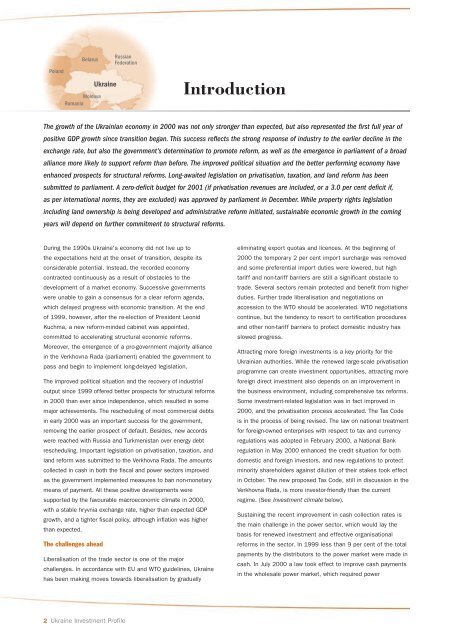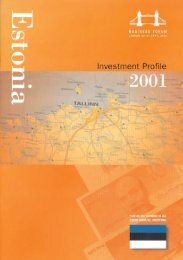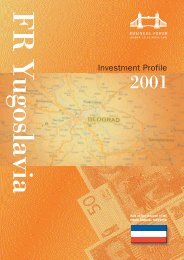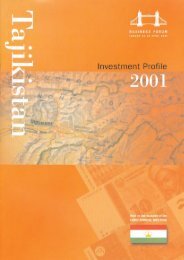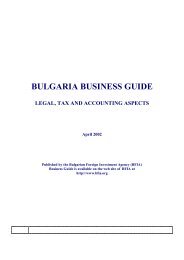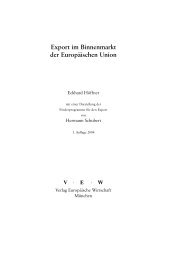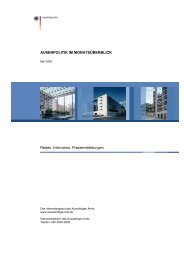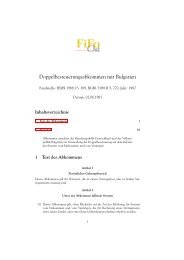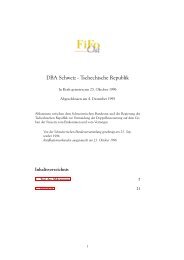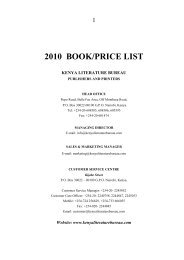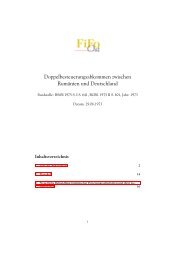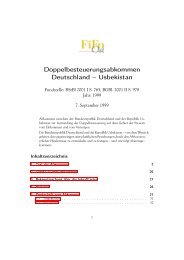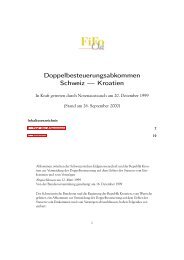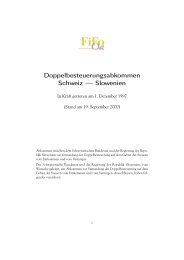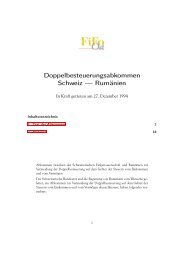EBRD activities in Ukraine - FiFo Ost
EBRD activities in Ukraine - FiFo Ost
EBRD activities in Ukraine - FiFo Ost
Create successful ePaper yourself
Turn your PDF publications into a flip-book with our unique Google optimized e-Paper software.
Poland<br />
Belarus<br />
Moldova<br />
Romania<br />
Ukra<strong>in</strong>e<br />
Russian<br />
Federation<br />
Dur<strong>in</strong>g the 1990s Ukra<strong>in</strong>e's economy did not live up to<br />
the expectations held at the onset of transition, despite its<br />
considerable potential. Instead, the recorded economy<br />
contracted cont<strong>in</strong>uously as a result of obstacles to the<br />
development of a market economy. Successive governments<br />
were unable to ga<strong>in</strong> a consensus for a clear reform agenda,<br />
which delayed progress with economic transition. At the end<br />
of 1999, however, after the re-election of President Leonid<br />
Kuchma, a new reform-m<strong>in</strong>ded cab<strong>in</strong>et was appo<strong>in</strong>ted,<br />
committed to accelerat<strong>in</strong>g structural economic reforms.<br />
Moreover, the emergence of a pro-government majority alliance<br />
<strong>in</strong> the Verkhovna Rada (parliament) enabled the government to<br />
pass and beg<strong>in</strong> to implement long-delayed legislation.<br />
The improved political situation and the recovery of <strong>in</strong>dustrial<br />
output s<strong>in</strong>ce 1999 offered better prospects for structural reforms<br />
<strong>in</strong> 2000 than ever s<strong>in</strong>ce <strong>in</strong>dependence, which resulted <strong>in</strong> some<br />
major achievements. The reschedul<strong>in</strong>g of most commercial debts<br />
<strong>in</strong> early 2000 was an important success for the government,<br />
remov<strong>in</strong>g the earlier prospect of default. Besides, new accords<br />
were reached with Russia and Turkmenistan over energy debt<br />
reschedul<strong>in</strong>g. Important legislation on privatisation, taxation, and<br />
land reform was submitted to the Verkhovna Rada. The amounts<br />
collected <strong>in</strong> cash <strong>in</strong> both the fiscal and power sectors improved<br />
as the government implemented measures to ban non-monetary<br />
means of payment. All these positive developments were<br />
supported by the favourable macroeconomic climate <strong>in</strong> 2000,<br />
with a stable hryvnia exchange rate, higher than expected GDP<br />
growth, and a tighter fiscal policy, although <strong>in</strong>flation was higher<br />
than expected.<br />
The challenges ahead<br />
Liberalisation of the trade sector is one of the major<br />
challenges. In accordance with EU and WTO guidel<strong>in</strong>es, Ukra<strong>in</strong>e<br />
has been mak<strong>in</strong>g moves towards liberalisation by gradually<br />
2 Ukra<strong>in</strong>e Investment Profile<br />
Introduction<br />
The growth of the Ukra<strong>in</strong>ian economy <strong>in</strong> 2000 was not only stronger than expected, but also represented the first full year of<br />
positive GDP growth s<strong>in</strong>ce transition began. This success reflects the strong response of <strong>in</strong>dustry to the earlier decl<strong>in</strong>e <strong>in</strong> the<br />
exchange rate, but also the government's determ<strong>in</strong>ation to promote reform, as well as the emergence <strong>in</strong> parliament of a broad<br />
alliance more likely to support reform than before. The improved political situation and the better perform<strong>in</strong>g economy have<br />
enhanced prospects for structural reforms. Long-awaited legislation on privatisation, taxation, and land reform has been<br />
submitted to parliament. A zero-deficit budget for 2001 (if privatisation revenues are <strong>in</strong>cluded, or a 3.0 per cent deficit if,<br />
as per <strong>in</strong>ternational norms, they are excluded) was approved by parliament <strong>in</strong> December. While property rights legislation<br />
<strong>in</strong>clud<strong>in</strong>g land ownership is be<strong>in</strong>g developed and adm<strong>in</strong>istrative reform <strong>in</strong>itiated, susta<strong>in</strong>able economic growth <strong>in</strong> the com<strong>in</strong>g<br />
years will depend on further commitment to structural reforms.<br />
elim<strong>in</strong>at<strong>in</strong>g export quotas and licences. At the beg<strong>in</strong>n<strong>in</strong>g of<br />
2000 the temporary 2 per cent import surcharge was removed<br />
and some preferential import duties were lowered, but high<br />
tariff and non-tariff barriers are still a significant obstacle to<br />
trade. Several sectors rema<strong>in</strong> protected and benefit from higher<br />
duties. Further trade liberalisation and negotiations on<br />
accession to the WTO should be accelerated. WTO negotiations<br />
cont<strong>in</strong>ue, but the tendency to resort to certification procedures<br />
and other non-tariff barriers to protect domestic <strong>in</strong>dustry has<br />
slowed progress.<br />
Attract<strong>in</strong>g more foreign <strong>in</strong>vestments is a key priority for the<br />
Ukra<strong>in</strong>ian authorities. While the renewed large-scale privatisation<br />
programme can create <strong>in</strong>vestment opportunities, attract<strong>in</strong>g more<br />
foreign direct <strong>in</strong>vestment also depends on an improvement <strong>in</strong><br />
the bus<strong>in</strong>ess environment, <strong>in</strong>clud<strong>in</strong>g comprehensive tax reforms.<br />
Some <strong>in</strong>vestment-related legislation was <strong>in</strong> fact improved <strong>in</strong><br />
2000, and the privatisation process accelerated. The Tax Code<br />
is <strong>in</strong> the process of be<strong>in</strong>g revised. The law on national treatment<br />
for foreign-owned enterprises with respect to tax and currency<br />
regulations was adopted <strong>in</strong> February 2000, a National Bank<br />
regulation <strong>in</strong> May 2000 enhanced the credit situation for both<br />
domestic and foreign <strong>in</strong>vestors, and new regulations to protect<br />
m<strong>in</strong>ority shareholders aga<strong>in</strong>st dilution of their stakes took effect<br />
<strong>in</strong> October. The new proposed Tax Code, still <strong>in</strong> discussion <strong>in</strong> the<br />
Verkhovna Rada, is more <strong>in</strong>vestor-friendly than the current<br />
regime. (See Investment climate below).<br />
Susta<strong>in</strong><strong>in</strong>g the recent improvement <strong>in</strong> cash collection rates is<br />
the ma<strong>in</strong> challenge <strong>in</strong> the power sector, which would lay the<br />
basis for renewed <strong>in</strong>vestment and effective organisational<br />
reforms <strong>in</strong> the sector. In 1999 less than 9 per cent of the total<br />
payments by the distributors to the power market were made <strong>in</strong><br />
cash. In July 2000 a law took effect to improve cash payments<br />
<strong>in</strong> the wholesale power market, which required power


